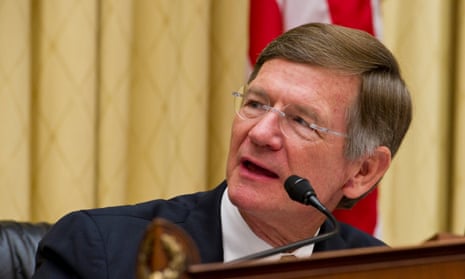If you don’t like a particular scientific study, attack the scientists who produced it. It’s a tried and true method of manufacturing controversy around inconvenient scientific analysis. And now, Lamar Smith, Chairman of the House of Representatives Committee on Science, Space, and Technology, is using the sledgehammer of a congressional subpoena to bully National Oceanic and Atmospheric Administration (NOAA) scientists for their research on climate change.
At issue is a paper published in Science earlier this year by NOAA scientists contradicting claims that the rate of global warming had recently slowed. The NOAA study is based on routine updates NOAA made to its surface temperature dataset, one of the many datasets that experts use to measure how fast the climate is changing. Scientists in many fields update datasets all the time to correct for differences in measurement techniques and to add new information. Multiple subsequent scientific papers derived from other data corroborate the NOAA scientists’ conclusions.
Chairman Smith, who has consistently dismissed mainstream climate science, sought more information about the study. NOAA scientists provided three separate briefings to Science Committee staff in July and September, answering questions about the research and directing staffers to the data and methodology, all of which was already publicly available. This is all anyone should need to assess the science. Yet on October 13, Chairman Smith issued a broad subpoena to NOAA demanding all correspondence, notes, peer review comments, paper drafts, and more among scientists from the last seven years related to this work.
Notably, Smith now has unilateral power to issue subpoenas without the consent of committee Democrats, making the process more vulnerable to politicization. We have seen subpoenas for confidential medical data from the Environmental Protection Agency and undue scrutiny of individual National Science Foundation grants.
Reaction to the latest power grab was swift and harsh. Representative Eddie Bernice Johnson, the committee’s ranking Democrat, sent a scathing letter condemning the actions as “illegitimate harassment.” The American Meteorological Society echoed this sentiment in its own letter to Chairman Smith. Factcheck.org found that the chairman had made “several inaccurate or misleading claims about climate science” in the course of his investigation.
Chairman Smith’s response to the criticism was to double down, mischaracterizing the updating of datasets as “altering data” and scheduling recorded interviews—effectively depositions—with NOAA staff. He has since appealed to the Secretary of Commerce to compel NOAA to comply with his demand.
So far, NOAA has stood its ground, rightly refusing to turn over the scientists’ correspondence. “Because the confidentiality of these communications among scientists is essential to frank discourse among scientists, those documents were not provided to the Committee,” NOAA told Inside Climate News.
This isn’t the first time that private companies and public officials have tried to access the correspondence of scientists whose research poses a threat to their interests. In what was widely seen as a witch hunt, former Virginia Attorney General Ken Cuccinelli used a Medicare fraud law to unsuccessfully subpoena the personal correspondence of climate scientists.
British Petroleum used subpoenas to access the correspondence of scientists who volunteered their expertise to fix the Deepwater Horizon oil disaster. Coal industry-funded organizations and anti-GMO activists have used open records laws to try to find material that could be used to discredit researchers. Congress using this tactic takes it to a new level. Although none of these investigations found any scientific misconduct, they did waste time and resources and sowed confusion.
Some argue that because federal government salaries are taxpayer-funded, the public should have access to scientists’ private conversations. But reasonable people don’t expect government attorneys to hand over the materials they exchange with their clients. They don’t expect members of Congress to turn over their own notes and emails either. No one can work in a climate where every email, meeting record or handwritten note could be publicly scrutinized and taken out of context.
Scientists enter government service to serve the public interest. Their research provides vital information to businesses and farmers and elected officials to grow our economy and protect the health and safety of our communities. But to do this they need the ability to collaborate freely with colleagues and experts inside and outside government, without fear of a congressional subpoena for politically unpopular research results.
We’re stronger, healthier and more prosperous because we grant scientists independence to go where the data leads them. NOAA should continue to stand strong against actions that would undermine the independence of its scientists and compromise our ability to make policy decisions informed by independent science.
Michael Halpern (@halpsci) is manager of strategy and innovation for the Center for Science and Democracy at the Union of Concerned Scientists.
